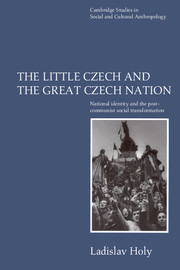 The Little Czech and the Great Czech Nation
The Little Czech and the Great Czech Nation Book contents
- Frontmatter
- Contents
- Acknowledgements
- Introduction
- 1 Nation against state
- 2 Freedom, nation, and personhood
- 3 Self-stereotypes and national traditions
- 4 National traditions and the imagining of the nation
- 5 National traditions and the political process
- 6 Nation and state in the context of Czech culture
- Notes
- References
- Index
6 - Nation and state in the context of Czech culture
Published online by Cambridge University Press: 05 June 2012
- Frontmatter
- Contents
- Acknowledgements
- Introduction
- 1 Nation against state
- 2 Freedom, nation, and personhood
- 3 Self-stereotypes and national traditions
- 4 National traditions and the imagining of the nation
- 5 National traditions and the political process
- 6 Nation and state in the context of Czech culture
- Notes
- References
- Index
Summary
The discourse surrounding the beginning of the economic transformation in post-communist Czechoslovakia explicitly contrasted the socialist planned economy with the market economy. The opposition between a natural process and human design which it articulated was explicitly posed by Prime Minister Václav Klaus in a television interview in October 1992 in which he objected to the interviewer's formulation ‘instituting a market economy’ and his question of when the process would be completed. In Klaus's view, a market economy was not something that could be instituted by human beings and certainly not something that could be declared as having been successfully instituted from a specific date. Rather it was a ‘spontaneous process’, and all people could do was to create the legislative conditions that would allow it to take place. The opposition between the naturally constituted or given and the artificially created through deliberate human design is an opposition that not only articulates and gives form to economic discourse but is regularly invoked and pervasive in many other discourses and in that sense can be seen as an important dichotomy of Czech culture.
Like any other culture, Czech culture is not isolated from others. Czechs constantly compare themselves with others, and Czech culture accepts new ideas and values from other cultures. This process is, however, highly selective, and it is again the opposition between the naturally constituted and the consciously created that provides the gauge for the acceptance or rejection of new trends.
- Type
- Chapter
- Information
- The Little Czech and the Great Czech NationNational Identity and the Post-Communist Social Transformation, pp. 168 - 204Publisher: Cambridge University PressPrint publication year: 1996
